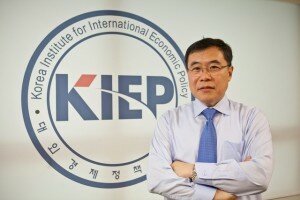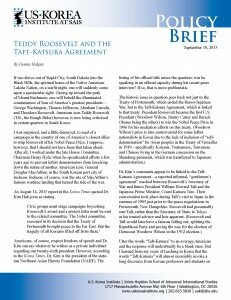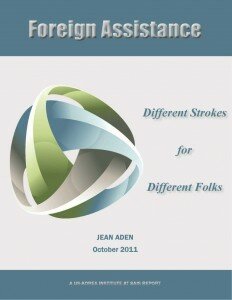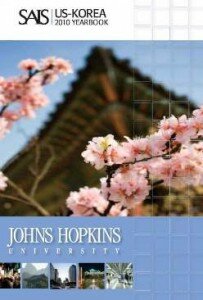Published on February 28, 2014
On Thursday, March 6, the US-Korea Institute at SAIS and Voice of America will launch the report, “Cell Phones in North Korea: Has North Korea Entered the Telecommunications Revolution?” by Voice of America reporter, Yonho Kim. Mr. Kim will present key findings from his research, which includes the influence of cell phones on social trends and economy in North Korea.
The panel also features two distinguished discussants, Alexandre Mansourov (US-Korea Institute at SAIS) and Sascha Meinrath (New America Foundation, Open Technology Institute), who will provide further insights into technical and regional uses of telecommunications and information technology.
This event is free and open to the public. Seating is limited, RSVP is required.
Live webcast of this event can be viewed at http://webcast.jhu.edu/Mediasite/Play/c63e47afe50f400eb9bce84a5896e58e1d.
Thursday, March 6, 2014
9:00 am – 10:30 am
Bernstein-Offit Building, Room 500
1717 Massachusetts Ave., NW
Washington, DC 20036
RSVP HERE
Published on March 11, 2014
Published on December 12, 2013
Published on October 8, 2013
 On Friday, October 11, the Johns Hopkins School of Advanced International Studies will feature a seminar by Dr. Il-Houng Lee, President of the Korea Institute for International Economic Policy (KIEP) and G20 Sherpa for the Republic of Korea, from 9:30 -11:30am at the Rome Auditorium at SAIS (1619 Massachusetts Ave NW). Dr. Lee will discuss the role of income inequality in economic growth, a subject he spoke on at G20 Summit meetings in Russia earlier this year.
On Friday, October 11, the Johns Hopkins School of Advanced International Studies will feature a seminar by Dr. Il-Houng Lee, President of the Korea Institute for International Economic Policy (KIEP) and G20 Sherpa for the Republic of Korea, from 9:30 -11:30am at the Rome Auditorium at SAIS (1619 Massachusetts Ave NW). Dr. Lee will discuss the role of income inequality in economic growth, a subject he spoke on at G20 Summit meetings in Russia earlier this year.
Dr. Lee’s talk is part of a week-long series of talks at SAIS, hosted by SAIS Dean Vali Nasr, covering key G20 issues. This event is free and open to public. To RSVP, please visit http://il-houng-lee.eventbrite.com/.
Published on September 11, 2013
Utter the words “Taft-Katsura” to an average American and the response will undoubtedly be a blank stare. But I learned from my years of teaching in Korea that the words “Taft-Katsura” will almost invariably invoke a long discourse from Korean professors and students on America’s betrayal of Korea in exchange for Japanese recognition of U.S. interests in the Philippines. “Taft-Katsura” is engraved in many minds as a key element in the victimization of Korea at the beginning of the twentieth century. ~ Dennis P. Halpin

On August 14, 2013, an article from the Korea Times quoted Dr. Kim Hak-joon, president of the Northeast Asian History Foundation (NAHF), who suggested former President Theodore Roosevelt be stripped of his 1906 Nobel Peace Prize.
Dennis P. Halpin, former House Foreign Relations Committee staff member and current Visiting Scholar at the U.S.-Korea Institute at SAIS, examines the history of the Taft-Katsura Agreement in defense of Roosevelt’s legacy.
Download USKI Policy Brief “Teddy Roosevelt and the Taft-Katsura Agreement,” by Dennis P. Halpin.
Dennis P. Halpin is currently a visiting scholar at the U.S.-Korea Institute at Johns Hopkins School of Advanced International Studies (SAIS). He served as a Peace Corps volunteer in South Korea, U.S. consul in Pusan, and a House Foreign Affairs Committee staff member for over twelve years.
Published on October 5, 2011
 The US-Korea Institute at SAIS is pleased to release the first report in a three-part series by Dr. Jean Aden, examining South Korea’s ODA future.
The US-Korea Institute at SAIS is pleased to release the first report in a three-part series by Dr. Jean Aden, examining South Korea’s ODA future.
Having accomplished one of the most successful economic transformations of the twentieth century, transitioning from a major aid recipient to major aid provider within fifty years, Korea has recent firsthand development knowledge and experience to share with others who are in the process of development, and is keen to develop its position as a donor and member of the international donor community, commensurate with the size of its economy. Despite having only recently joined the DAC, the OECD’s choice to locate the 4th High Level Forum for Development Effectiveness (HLF-4) in Busan in November 2011 is an indicator of Korea’s potential to help shape the strategic agenda, while expanding its own development commitments. read more …
Published on May 7, 2011
 The U.S.-Korea Institute at SAIS is pleased to announce the release of the 2010 Edition of the SAIS U.S.-Korea Yearbook.
The U.S.-Korea Institute at SAIS is pleased to announce the release of the 2010 Edition of the SAIS U.S.-Korea Yearbook.
The Yearbook analyzes important developments in North and South Korea that characterized their relations in 2010. Each paper was written by a SAIS student from the course, “The Two Koreas: Contemporary Research and Record,” in the fall of 2010. Their insights were based on extensive reading and study as well as on numerous interviews conducted with government officials, scholars, NGO workers, academics and private sector experts both in Washington and Seoul.
Explore the 2010 SAIS U.S.-Korea Yearbook.





